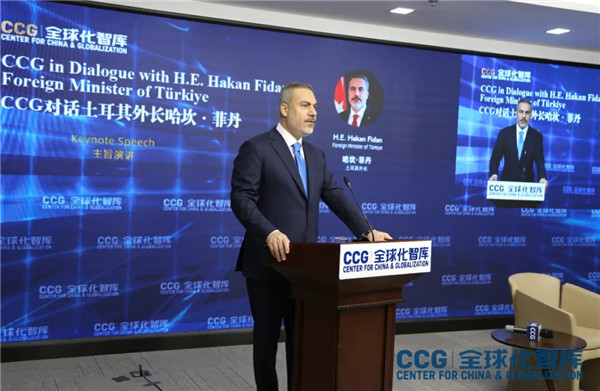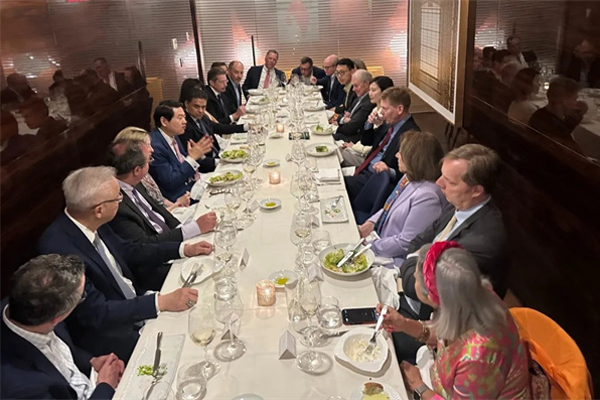The CCG’s ‘track-II’ diplomacy in America (X) – Cooperating with Migration Policy Institute in studying international migration and talents
At the beginning of October, the team from Center for China and Globalization (CCG) held a meeting with the Migration Policy Institute. The Migration Policy Institute is the pioneering think tank of migration study in America. The meeting was held at its headquarter in Washington D.C. During the meeting, the two sides expressed their views on the trends of global migration, the Trump administration on migration policy, the international flow of talents, as well as the two think tanks’ cooperation on the future study of migration. Through the visit, the CCG team enlarged their knowledge of American politics and American migration policy from the perspective of migration.
Andrew Selee, the President of Migration Policy Institute hosted the discussion. The guests that attended the meeting included Kathleen Newland, the Co-founder and Senior Researcher of Migration Policy Institute, Jamie Horsley, the Visiting Fellow of Foreign Policy at John L. Thornton China Center of Brookings Institution, and Sandy Pho, the Senior Associate of Wilson Center Kissinger Institute on China and the United States.
The meeting reacted to the modifications of American migration policy by President Trump. Thus far, the migration issue has been the a popular topic of discussion worldwide. Particularly, the flow of capital and cargo and of migration and talents will also become the new motivation for globalization.
During the meeting, Dr. Wang Huiyao addressed a speech on the latest policy of China on talents attraction. By taking part in the policy-making on talents attraction of Zhongguancun, Beijing, the designing of Chinese Green Card system and etc., CCG has been devoted to pursuing a more open policy on international talents for the Chinese government.
As the two top think tanks in migration study, the two sides introduced each other to their respective research results on this area. Every year CCG publishes its Bluebook on International Migration of China. On the side of MPI, as a leading think tank in migration study in America, the researchers of MPI also introduced the institute’s main duty, publications and its impact on the migration policy of the American government. CCG has been closely working with MPI and the two used to co-organize an event surrounding the international flow of talents in Beijing in Aug 2013, which has had a far-reaching influence on the talents policy of China.
Prior to President Trump’s visit to China and following the first- round cultural and social communication between China and America led by Liu Yandong, the Vice Premier of State Council, the cultural exchange between the two countries has been the main force in driving the long-term development of the two countries’ relations. Through this visit, CCG aims to deepen the mutual trust and understanding between the two countries and help think tanks play a bigger role in influencing government policies and the development of companies.
CCG’s week-long journey to America started on Sep 29 and will last until Oct 4. During the journey, the team of CCG visited Council on Foreign Relations, Asia Society, National Committee on United States-China Relations and Committee of 100 in New York. In Washington D.C, it organized several symposiums with world-class think tanks in the U.S., which included Asia Society Policy Study Institute, AEI, the Heritage Foundation, Center for American Progress, American Migration Policy Institute, Brookings Institute, CSIS, Wilson Center Kissinger Institute on China, and PIIE.
As a leading independent think tank from China, CCG’s visit has facilitated and materialized the cultural exchange and cooperation between China and America. The CCG team include includes the following participants: Wang Huiyao, the President of CCG, Miao Lu, the Secretary-General of CCG, Li Weifeng, the Executive Secretary-General of CCG, Tang Beijie, the Deputy Secretary-General, Xiao Huilin, the Senior Researcher of CCG, Wang Zhi, the Non-Resident Senior Fellow of CCG, and Li Yeqing, the Non-Resident Senior Fellow.
At the beginning of October, the team from Center for China and Globalization (CCG) held a meeting with the Migration Policy Institute. The Migration Policy Institute is the pioneering think tank of migration study in America. The meeting was held at its headquarter in Washington D.C. During the meeting, the two sides expressed their views on the trends of global migration, the Trump administration on migration policy, the international flow of talents, as well as the two think tanks’ cooperation on the future study of migration. Through the visit, the CCG team enlarged their knowledge of American politics and American migration policy from the perspective of migration.
Andrew Selee, the President of Migration Policy Institute hosted the discussion. The guests that attended the meeting included Kathleen Newland, the Co-founder and Senior Researcher of Migration Policy Institute, Jamie Horsley, the Visiting Fellow of Foreign Policy at John L. Thornton China Center of Brookings Institution, and Sandy Pho, the Senior Associate of Wilson Center Kissinger Institute on China and the United States.
The meeting reacted to the modifications of American migration policy by President Trump. Thus far, the migration issue has been the a popular topic of discussion worldwide. Particularly, the flow of capital and cargo and of migration and talents will also become the new motivation for globalization.
During the meeting, Dr. Wang Huiyao addressed a speech on the latest policy of China on talents attraction. By taking part in the policy-making on talents attraction of Zhongguancun, Beijing, the designing of Chinese Green Card system and etc., CCG has been devoted to pursuing a more open policy on international talents for the Chinese government.
As the two top think tanks in migration study, the two sides introduced each other to their respective research results on this area. Every year CCG publishes its Bluebook on International Migration of China. On the side of MPI, as a leading think tank in migration study in America, the researchers of MPI also introduced the institute’s main duty, publications and its impact on the migration policy of the American government. CCG has been closely working with MPI and the two used to co-organize an event surrounding the international flow of talents in Beijing in Aug 2013, which has had a far-reaching influence on the talents policy of China.
Prior to President Trump’s visit to China and following the first- round cultural and social communication between China and America led by Liu Yandong, the Vice Premier of State Council, the cultural exchange between the two countries has been the main force in driving the long-term development of the two countries’ relations. Through this visit, CCG aims to deepen the mutual trust and understanding between the two countries and help think tanks play a bigger role in influencing government policies and the development of companies.
CCG’s week-long journey to America started on Sep 29 and will last until Oct 4. During the journey, the team of CCG visited Council on Foreign Relations, Asia Society, National Committee on United States-China Relations and Committee of 100 in New York. In Washington D.C, it organized several symposiums with world-class think tanks in the U.S., which included Asia Society Policy Study Institute, AEI, the Heritage Foundation, Center for American Progress, American Migration Policy Institute, Brookings Institute, CSIS, Wilson Center Kissinger Institute on China, and PIIE.
As a leading independent think tank from China, CCG’s visit has facilitated and materialized the cultural exchange and cooperation between China and America. The CCG team include includes the following participants: Wang Huiyao, the President of CCG, Miao Lu, the Secretary-General of CCG, Li Weifeng, the Executive Secretary-General of CCG, Tang Beijie, the Deputy Secretary-General, Xiao Huilin, the Senior Researcher of CCG, Wang Zhi, the Non-Resident Senior Fellow of CCG, and Li Yeqing, the Non-Resident Senior Fellow.
LocationUnited States





